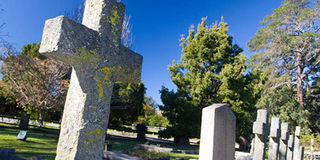How Covid-19 has handed me a grieving mess

The burial ceremony is expected to be a strangely lonely affair, with only 15 people allowed into the homestead. PHOTO | FILE | NATION MEDIA GROUP
What you need to know:
- My uncle’s clout among his peers was enhanced in no small measure by the fact that he received secondary education and worked as a teacher.
The public health guidelines enforced by governments across the world to contain the spread of the coronavirus have raised concerns about the damage they portend to the social fabric that has held families and communities together for generations.
For us, this jajuok (witch) of a bug has affected how we cope with grief from the loss of the pillar of our extended family.
My maternal uncle Charmlus Ademba Rayola Otieno died (of a condition not related to the virus) and will be buried this week.
Because of the restrictions on movement in and out of Nairobi, Mombasa, Kilifi, Kwale and parts of Kiambu and other counties, many of our relatives and friends can’t travel for the funeral in Kisumu.
Our relatives in Rwanda — including his firstborn daughter — Uganda, Tanzania and South Africa won’t make it too. The burial ceremony is expected to be a strangely lonely affair, with only 15 people allowed into the homestead.
As if his death isn’t devastating enough, we now have this guilt of not having been there to give my uncle a dignified send-off to deal with for the rest of our lives.
The firstborn of the Sarah Oigo extended family, with roots in Kano and Kabondo, he grew up to shoulder a heavy responsibility for its unity and welfare.
THE PROTECTOR
This role often tested his leadership skills and courage, but he was rarely found wanting.
My mother, the third-born, recalls how as teenage girls growing up in Bwanda Kanyagwal, big brother would fight tooth and nail to protect them from hard-core village criminals and rapists like Omoro Thur.
A legend of sorts in the village criminal underworld, Omoro Thur would waylay and abduct women and girls going to Nyang’ande market and detain them in his house as sex slaves for days or weeks.
So feared was the local ‘Mafioso’, even the chief would be reluctant to arrest him.
But in their encounters with Omoro Thur, my mother and her age-mates from Bwanda only needed to drop Ademba Kotieno’s name to be allowed to pass.
My uncle’s clout among his peers was enhanced in no small measure by the fact that he received secondary education and worked as a teacher, putting him in a relatively privileged class at the time.
He was also among the very first people to own a vinyl record player in his village.
TRIBUTE
In the pre-coronavirus world, I would have attended his funeral to speak on behalf of myself and the many cousins, nephews and nieces about his selfless efforts to give us an education and hand us a lifeline out of possible destitution, the high standards he set for us, the personal sacrifices he had to make along the way.
As I have openly told a few friends in the past, I’m a lucky bastard — an offspring of prohibited love between two teenagers whom God gave a caring and loving uncle for a father.
RIP Wuod Othoro.
[email protected]. @otienootieno





